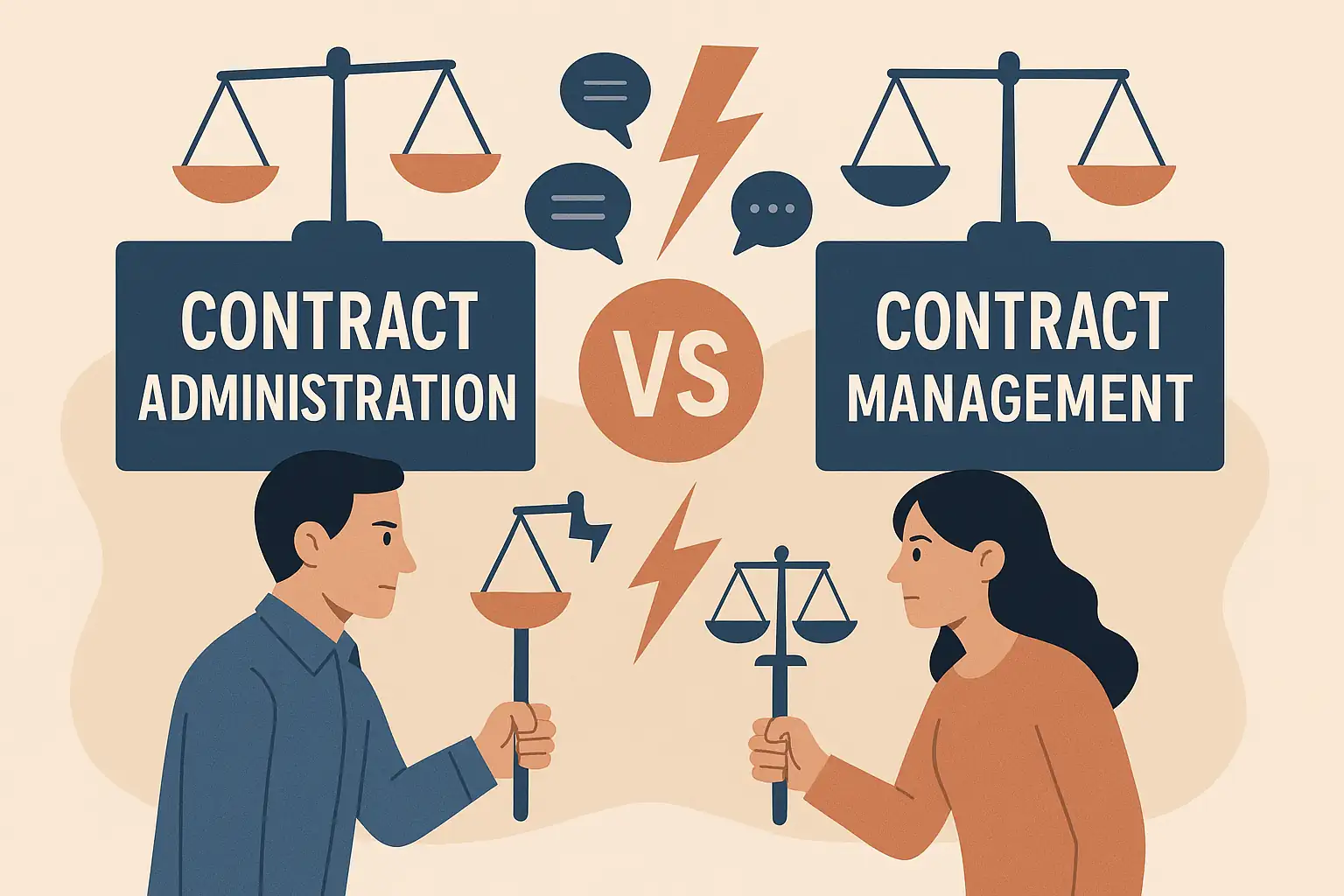Introduction
The effective handling of contracts is paramount to ensuring successful project outcomes. Two critical components in this process are contract administration and contract management. While often used interchangeably, these terms represent distinct functions that play vital roles in the lifecycle of a contract.
- Contract Administration refers to the operational aspect that begins after a contract is signed. It focuses on the enforcement of the agreed terms, ensuring compliance, and managing the day-to-day execution of the contract. This includes monitoring performance, addressing any issues that arise, and facilitating smooth closure of the contract once its objectives are met [1][7].
- Contract Management, on the other hand, encompasses the entire lifecycle of a contract, from its initial drafting and negotiation to performance monitoring and renewal. It is a strategic function that aims to align the contract with the broader goals of the project and organization, ensuring that value is created throughout the contract’s duration [1][5].
Understanding the differences between these two functions is crucial for project managers and legal advisors. Effective contract management can help mitigate risks and enhance supplier relationships, while robust contract administration ensures that the terms of the contract are upheld and any disputes are managed efficiently [4][8].
Disputes in contract management can arise from various sources, including misunderstandings of contract terms, non-compliance, or changes in project scope. These disputes can have significant implications for projects, potentially leading to delays, increased costs, and strained relationships between parties involved. Therefore, recognizing the importance of both contract management and administration is essential for navigating these conflicts and implementing effective resolution strategies [2][3][9].
In this blog section, we will explore various strategies for resolving disputes in contract management, emphasizing the need for clear communication, thorough documentation, and proactive engagement between all parties involved. By fostering a deeper understanding of these concepts, project managers and legal advisors can better navigate the complexities of contract disputes and contribute to the overall success of their projects.
Understanding Contract Administration and Contract Management
The terms “contract administration” and “contract management” are often used interchangeably, yet they represent distinct phases of the contracting process. Understanding these differences is crucial for project managers and legal advisors, as both functions play a vital role in ensuring project success and minimizing disputes.
Definitions
- Contract Management: This encompasses the entire lifecycle of a contract, from drafting and negotiation to monitoring performance and renewal. It focuses on strategic alignment and value creation, ensuring that all parties adhere to their contractual obligations and that any necessary changes are negotiated effectively [10][15].
- Contract Administration: This phase begins post-signature and emphasizes the operational execution of the agreed terms. It involves ensuring compliance with the contract, managing day-to-day operations, and facilitating smooth closure of the contract [10][12].
Roles and Responsibilities
- Contract Managers: These professionals are responsible for overseeing the entire contract lifecycle. Their duties include negotiating terms, monitoring compliance, and ensuring that the contract aligns with the strategic goals of the organization. They act as the primary point of contact for all stakeholders involved, which requires strong communication and collaboration skills [14][15].
- Contract Administrators: While they may fulfill project management roles, their primary focus is on the operational aspects of the contract. They ensure that the terms are executed as agreed and manage any administrative tasks related to the contract. This role is crucial for maintaining the integrity of the contract and preventing disputes from arising [6][10].
Importance in Project Success
Both contract management and contract administration are essential for the success of any project. Effective contract management ensures that the project aligns with organizational goals and that all parties are held accountable for their obligations. This strategic oversight helps in identifying potential issues before they escalate into disputes [11][12].
On the other hand, robust contract administration ensures that the operational aspects of the contract are executed smoothly. By maintaining clear communication and adherence to the contract terms, project managers can foster positive relationships with stakeholders and reduce the likelihood of conflicts [2][11].
Understanding the nuances between contract administration and contract management is vital for project managers and legal advisors. By recognizing their distinct roles and responsibilities, professionals can implement effective strategies for conflict resolution, ultimately leading to successful project outcomes.
Common Causes of Contract Disputes
Understanding the common causes of contract disputes is crucial for effective conflict resolution. By identifying these sources of conflict, project managers and legal advisors can implement strategies to prevent disputes from arising and address them promptly when they do occur. Here are some key points to consider:
- Inadequate Communication and Documentation: Poor communication among stakeholders can lead to misunderstandings regarding project expectations and obligations. When documentation is lacking or unclear, it becomes challenging to establish a mutual understanding of the contract terms, which can result in disputes over responsibilities and deliverables [3][6].
- Ambiguities in Contract Terms: Contracts that contain vague or poorly defined terms can create confusion and differing interpretations among parties involved. This ambiguity often leads to disagreements about what is expected from each party, making it a significant source of conflict in contract management [3][14].
- Changes in Scope or Project Requirements: Scope creep, or the continuous addition of work beyond the original agreement, is a common issue in project management. When project requirements change without proper documentation and agreement, it can lead to disputes over additional costs, timelines, and responsibilities [5][6]. Effective management of variations and clear communication about changes are essential to mitigate this risk.
- Differing Interpretations of Contract Clauses: Disputes often arise from varying interpretations of specific contract clauses. When parties have different understandings of their rights and obligations, it can lead to conflicts that may escalate into formal disputes. Ensuring that all parties have a clear and consistent understanding of the contract is vital for preventing such issues [3][10].
By recognizing these common causes of contract disputes, project managers and legal advisors can take proactive steps to enhance communication, clarify contract terms, manage scope changes effectively, and ensure a shared understanding of contractual obligations. Implementing these strategies not only aids in conflict prevention but also fosters a more collaborative and productive project environment.
Strategies for Effective Conflict Resolution
Particularly when dealing with contracts, disputes can arise that threaten the success of a project. Effective conflict resolution strategies are essential for project managers and legal advisors to navigate these challenges. Here are some actionable strategies to address disputes when they arise:
- Establish Clear Communication Channels: Open and transparent communication is vital in preventing misunderstandings that can lead to disputes. By ensuring that all parties involved in the contract have access to clear lines of communication, project managers can foster an environment where concerns are addressed promptly. This proactive approach not only helps in resolving issues quickly but also builds trust among stakeholders, which is crucial for long-term collaboration [2][8].
- Encourage Collaborative Problem-Solving: When conflicts arise, it is important to approach them as opportunities for collaboration rather than confrontation. Encouraging all parties to engage in collaborative problem-solving can lead to innovative solutions that satisfy everyone involved. This strategy promotes a sense of ownership and accountability, as stakeholders work together to find mutually beneficial outcomes [3][4].
- Utilize Mediation and Arbitration as Alternative Dispute Resolution Methods: In cases where direct negotiation fails, mediation and arbitration can serve as effective alternative dispute resolution (ADR) methods. Mediation involves a neutral third party who facilitates discussions between the conflicting parties, helping them reach a voluntary agreement. Arbitration, on the other hand, involves a third party making a binding decision based on the evidence presented. Both methods can save time and resources compared to litigation, making them valuable tools in contract management [11][15].
- Implement Regular Contract Reviews to Preempt Potential Conflicts: Regularly reviewing contracts can help identify potential issues before they escalate into disputes. By conducting these reviews, project managers can ensure that all parties are adhering to the terms of the contract and can address any ambiguities or misunderstandings early on. This proactive measure not only mitigates risks but also reinforces the importance of compliance and accountability among stakeholders [4][12].
By employing these strategies, project managers and legal advisors can effectively navigate disputes in contract management, fostering a collaborative environment that enhances project success and stakeholder relationships.
Best Practices for Avoiding Disputes
Particularly when dealing with contracts, the potential for disputes is ever-present. However, by implementing proactive measures, project managers and legal advisors can significantly minimize the risk of conflicts arising. Here are some best practices to consider:
- Draft Clear and Comprehensive Contracts: A well-structured contract is fundamental to preventing disputes. Contracts should be legally sound, clear, and comprehensive, ensuring that all parties understand their rights and obligations. This clarity reduces the likelihood of differing interpretations that can lead to conflicts [12].
- Incorporate Dispute Resolution Clauses: During the contract creation phase, it is essential to include specific dispute resolution clauses. These clauses outline the procedures to be followed in the event of a disagreement, such as mediation or arbitration. By establishing a clear path for resolution upfront, parties can avoid lengthy and costly litigation [12].
- Maintain Thorough Documentation: Throughout the project lifecycle, maintaining meticulous documentation is crucial. This includes keeping records of all communications, changes, and approvals related to the contract. Proper documentation not only provides a clear trail of decisions made but also serves as evidence in case disputes arise, thereby facilitating smoother resolution processes [6][7].
- Foster Strong Relationships with Stakeholders and Team Members: Building and nurturing strong relationships with all stakeholders involved in the project can significantly reduce the risk of disputes. Open lines of communication and a collaborative approach help in addressing potential issues before they escalate into conflicts. Acting in good faith and prioritizing punctuality and communication can further enhance these relationships [4][15].
By adopting these best practices, project managers and legal advisors can create a more harmonious project environment, ultimately leading to successful outcomes and minimized disputes.
Case Studies: Successful Conflict Resolution
Effective conflict resolution is crucial for maintaining project integrity and ensuring successful outcomes. Below are several case studies that illustrate successful dispute resolution strategies, the methods employed, and the lessons learned from these experiences.
Case Study 1: Construction Project Dispute
Background: A large construction project faced significant delays due to disagreements between the contractor and the client regarding project specifications and timelines.
Strategies Employed:
– Mediation: The parties engaged a neutral third-party mediator to facilitate discussions. This approach allowed both sides to express their concerns in a structured environment.
– Collaborative Problem Solving: The mediator encouraged a collaborative approach, prompting both parties to work together to identify common goals and interests.
Lessons Learned:
– Importance of Communication: Open lines of communication were vital in understanding each party’s perspective, which helped in reaching a mutually beneficial agreement.
– Flexibility in Negotiation: Being willing to adapt and compromise on certain aspects of the project led to a quicker resolution.
Outcomes:
– The project was back on track within weeks, with a revised timeline that satisfied both parties. This experience reinforced the importance of mediation in resolving disputes and highlighted the need for clear communication channels in future projects [4][10].
Case Study 2: IT Project Contract Dispute
Background: An IT firm encountered a dispute with a client over the scope of work and deliverables, leading to a potential contract breach.
Strategies Employed:
– Negotiation: The project manager initiated direct negotiations with the client to clarify expectations and deliverables.
– Documentation Review: Both parties reviewed the contract terms together to identify areas of misunderstanding and miscommunication.
Lessons Learned:
– Clarity in Contract Terms: The importance of having clear, detailed contract terms was underscored, as ambiguity can lead to disputes.
– Proactive Engagement: Addressing issues early through direct negotiation can prevent escalation into more serious conflicts.
Outcomes:
– The dispute was resolved amicably, with both parties agreeing to a revised scope of work. This case highlighted the effectiveness of proactive communication and the need for precise contract language in future agreements [2][5].
Case Study 3: Public Sector Project Dispute
Background: A public sector infrastructure project faced a dispute over budget overruns and delays attributed to unforeseen circumstances.
Strategies Employed:
– Arbitration: The parties agreed to arbitration as a means to resolve the dispute without resorting to litigation.
– Joint Risk Assessment: A joint risk assessment was conducted to evaluate the causes of the overruns and delays, allowing both parties to understand the situation better.
Lessons Learned:
– Risk Management: The necessity of comprehensive risk management strategies was emphasized, as early identification of potential issues can mitigate disputes.
– Third-Party Involvement: Utilizing arbitration provided a fair resolution mechanism that preserved the working relationship between the parties.
Outcomes:
– The arbitration process resulted in a fair settlement that allowed the project to continue with adjusted budgets and timelines. This case demonstrated the value of third-party involvement in complex disputes and the importance of risk management in project planning [1][9].
These case studies illustrate the diverse strategies employed in resolving contract disputes within project management. The lessons learned from these experiences emphasize the importance of clear communication, proactive engagement, and effective risk management. By applying these conflict resolution strategies, project managers and legal advisors can navigate disputes more effectively, ensuring successful project outcomes and fostering long-term relationships with stakeholders.
Conclusion
A clear understanding of the distinctions between contract administration and contract management is paramount. Contract management encompasses the entire lifecycle of a contract, from its initial drafting and negotiation to performance monitoring and eventual renewal. This holistic approach ensures that strategic alignment and value creation are prioritized throughout the contract’s duration. Conversely, contract administration focuses on the operational execution of the contract post-signature, emphasizing compliance with agreed terms and the smooth closure of the contract [1][2][4]. Recognizing these differences allows project managers and legal advisors to navigate the complexities of contractual relationships more effectively.
The value of conflict resolution strategies cannot be overstated. Effective contract management and administration are essential for ensuring compliance, mitigating risks, and maximizing the value derived from contractual arrangements. By implementing robust conflict resolution strategies, project managers can address disputes proactively, thereby maintaining positive relationships between all parties involved [8][12]. This proactive approach not only minimizes the risk of disputes but also enhances the overall efficiency of project execution.
It is crucial for project managers and legal advisors to adopt proactive measures in managing contracts effectively. This includes understanding the nuances of contract administration and management, employing conflict resolution strategies, and fostering open communication among stakeholders. By doing so, they can navigate disputes more adeptly and ensure that contractual obligations are met, ultimately leading to successful project outcomes [3][6][8].
Find out more about Shaun Stoltz https://www.shaunstoltz.com/about/.
This post was written by an AI and reviewed/edited by a human.



